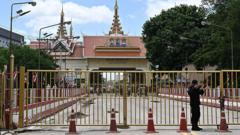A surge in rare earth mining activities in conflict-ridden Myanmar, primarily driven by Chinese enterprises, is causing significant pollution in Thailand's rivers. This unregulated mining is introducing dangerous levels of arsenic and other toxic metals, posing severe health risks to local communities.**
Environmental Crisis on Thailand-Myanmar Border: Mining Activities Poison Waterways**

Environmental Crisis on Thailand-Myanmar Border: Mining Activities Poison Waterways**
Unregulated rare earth mining in Myanmar has escalated environmental hazards in Thailand, leading to alarming levels of toxins in local water sources.**
---
In the heart of Southeast Asia, the once-pristine Kok River, crucial to both Thailand and Myanmar, has seen its waters turn foul due to unregulated mining activities. Years of rare earth mining, primarily led by Chinese entities in Myanmar's border regions, have escalated an environmental crisis that is now spilling over into Thailand.
Reports indicate that toxic metal levels, including arsenic, have surged in Thai rivers, with the Kok River and several others now displaying disturbing quantities of contaminants. Local residents, who used to enjoy fishing and swimming in the once-clear waters, now refrain from entering the river due to alarming health concerns. Skin irritations have become common, and there is a growing fear of long-term illnesses such as lung, bladder, and kidney cancers.
Local farmers report that the once crystal-clear river has transformed into a murky stream, laden with pollutants believed to arise from mining activities across the border. Community leaders express frustration over the lack of regulation and oversight, as they witness the degradation of their natural resources.
Since the emergence of rare earth mines in Myanmar, the local ecosystem has suffered grievously. Environmental studies reveal that pollutants are now infiltrating the Mekong River, Southeast Asia's vital waterway. This escalating ecological disaster raises urgent questions about the consequences of lucrative but destructive mining practices that prioritize profit over protection of the environment.
As Thailand grapples with the ramifications of this pollution crisis, public health officials urge for immediate action. They call for stricter regulations on mining practices, better monitoring of ecological health, and collaborative efforts between Myanmar and Thailand to safeguard shared water resources.
The stark reality on the ground highlights a crucial need to address the balance between economic development through mining and the preservation of vital ecosystems for future generations. The fate of the Kok River, along with the health of countless communities, hangs in a delicate balance.
In the heart of Southeast Asia, the once-pristine Kok River, crucial to both Thailand and Myanmar, has seen its waters turn foul due to unregulated mining activities. Years of rare earth mining, primarily led by Chinese entities in Myanmar's border regions, have escalated an environmental crisis that is now spilling over into Thailand.
Reports indicate that toxic metal levels, including arsenic, have surged in Thai rivers, with the Kok River and several others now displaying disturbing quantities of contaminants. Local residents, who used to enjoy fishing and swimming in the once-clear waters, now refrain from entering the river due to alarming health concerns. Skin irritations have become common, and there is a growing fear of long-term illnesses such as lung, bladder, and kidney cancers.
Local farmers report that the once crystal-clear river has transformed into a murky stream, laden with pollutants believed to arise from mining activities across the border. Community leaders express frustration over the lack of regulation and oversight, as they witness the degradation of their natural resources.
Since the emergence of rare earth mines in Myanmar, the local ecosystem has suffered grievously. Environmental studies reveal that pollutants are now infiltrating the Mekong River, Southeast Asia's vital waterway. This escalating ecological disaster raises urgent questions about the consequences of lucrative but destructive mining practices that prioritize profit over protection of the environment.
As Thailand grapples with the ramifications of this pollution crisis, public health officials urge for immediate action. They call for stricter regulations on mining practices, better monitoring of ecological health, and collaborative efforts between Myanmar and Thailand to safeguard shared water resources.
The stark reality on the ground highlights a crucial need to address the balance between economic development through mining and the preservation of vital ecosystems for future generations. The fate of the Kok River, along with the health of countless communities, hangs in a delicate balance.





















